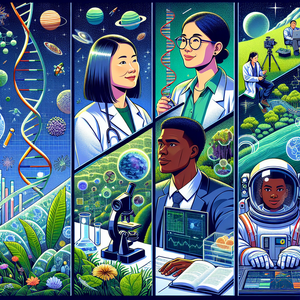
Discover 15 Thrilling Scientific Careers: A Journey Through Diverse Roles and Their Societal Impact
The realm of scientific careers is vast and varied, presenting a multitude of paths tailored to different interests and skills. With a spectrum that spans from traditional fields like biology and chemistry to niche areas such as marine biology and astrobiology, the opportunity for exploration is endless. This article takes you on a journey through 15 fascinating scientific roles, detailing their responsibilities, educational prerequisites, and significant contributions to society while also reflecting on current trends and job market insights.
Job Summaries:
Astronomer:
- Astronomers delve into the mysteries of celestial bodies and phenomena beyond our planet.
- Utilizing cutting-edge telescopes and technology, they analyze stellar light and theorize about the universe's origins.
- Typically, a master's degree or PhD in astronomy or astrophysics is required.
- Their work not only expands our understanding of space but also informs practical applications in space exploration.
- Job Market Insight: The demand for astronomers is expected to rise by 5% over the next decade, with average salaries around $120,000.
Marine Biologist:
- Marine biologists explore ocean ecosystems, focusing on the behavior and physiology of marine life.
- Their responsibilities include conducting field studies and laboratory experiments to evaluate the health of marine environments.
- A degree in marine biology is essential, along with scuba diving certifications.
- This role is crucial for conservation efforts and understanding climate change impacts.
- Current Trends: There is a growing demand for marine scientists, particularly in sustainable marine practices.
Botanist:
- Focusing on plant science, botanists perform experiments to investigate plant biology, ecology, and taxonomy.
- A bachelor’s degree in botany or a related field is typically required, with advanced degrees preferred for research roles.
- Their research significantly influences agriculture, conservation, and pharmacology.
- Salary Statistics: Botanists generally earn an average salary of $70,000, with job growth anticipated as sustainable agriculture gains importance.
Chemist:
- Chemists study substances' properties and reactions.
- Innovating new materials in areas such as pharmaceuticals and environmental science.
- A bachelor's degree in chemistry is the minimum requirement.
- Many positions requiring a master's or PhD.
- Chemists are vital in advancing drug development and sustainable energy solutions.
- Job Outlook: Anticipated growth in this field is around 6%.
- Average salaries of $80,000.
Geneticist:
- Geneticists examine genes and heredity, concentrating on DNA's structure and function.
- Their research facilitates advancements in medicine, agriculture, and biotechnology.
- Generally, a PhD is necessary for research-focused positions.
- As personalized medicine continues to grow in popularity, the demand for geneticists is expected to increase significantly.
Microbiologist:
- Microbiologists study microorganisms to elucidate their roles in health, disease, and the environment.
- A degree in microbiology or a related field is essential, with advanced qualifications often preferred.
- Their work is critical for public health and food safety.
- Employment Data: This field is projected to grow by 5%, with microbiologists earning an average salary of $70,000.
Physicist:
- Physicists investigate the fundamental principles of matter and energy.
- Conducting research in areas like quantum mechanics.
- A PhD is typically required for research positions.
- Their contributions lead to technological advancements and deeper insights into the universe.
- Growth Projections: The job market for physicists is expected to expand by 7%.
- Average salaries around $120,000.
Environmental Scientist:
- Environmental scientists tackle pressing environmental issues, such as pollution and climate change.
- A degree in environmental science is essential, with many roles requiring a master's degree.
- This profession is integral to promoting sustainability.
- Job Outlook: Anticipated growth for environmental scientists is projected at 8% as awareness of environmental issues increases.
Geologist:
- Geologists examine Earth's materials and processes, focusing on natural resources and environmental protection.
- A degree in geology or earth sciences is necessary, with advanced degrees often needed for specialized roles.
- They are pivotal in resource management and disaster mitigation.
- Current Trends: This field is expected to grow by 6%, with geologists earning an average salary of $90,000.
Biomedical Scientist:
- Biomedical scientists conduct research to advance healthcare by studying diseases and developing new treatments.
- A degree in biomedical science or a related field is required, often necessitating advanced degrees for research roles.
- Their work leads to breakthroughs in medical technology.
- Job Growth: The demand for biomedical scientists is projected to grow by 10%, with average salaries around $85,000.
Zoologist:
- Zoologists focus on animal species and their ecosystems.
- They often conduct field research to analyze animal interactions.
- A degree in zoology is necessary, with advanced education preferred for research roles.
- Their contributions are critical to biodiversity conservation.
- The average salary for zoologists is approximately $63,000.
- Expected job growth is linked to increased wildlife protection efforts.
Astrobiologist:
- Astrobiologists explore the origins and potential for life beyond Earth.
- They often investigate extreme environments.
- A degree in astrobiology or a related field is necessary.
- Advanced degrees are preferred for research positions.
- This field broadens our understanding of life's possibilities in the cosmos.
- Future Outlook: As space exploration expands, the demand for astrobiologists is anticipated to rise.
Forensic Scientist:
- Forensic scientists apply scientific principles to criminal investigations.
- Meticulously analyzing evidence to solve crimes.
- A degree in forensic science is required.
- Specialized training in areas like toxicology is necessary.
- Their work is vital to the justice system.
- This field is expected to grow by 11%.
- Average salaries around $70,000.
Ecologist:
- Ecologists study the relationships between organisms and their environments.
- They focus on the structures of ecosystems.
- A degree in ecology or environmental science is essential, with advanced degrees preferred.
- Ecologists play an essential role in conservation and environmental policy.
- Job Demand: The demand for ecologists is projected to grow by 7%.
- Salaries average $75,000.
Anthropologist:
- Anthropologists investigate human behavior and cultures.
- They conduct fieldwork or analyze historical artifacts.
- A degree in anthropology is necessary, with advanced degrees preferred for research roles.
- Their insights enhance our understanding of human diversity.
- Employment Trends: The field is expected to grow by 5%.
- Average salaries are around $65,000.
The array of scientific careers available today offers countless avenues for those passionate about science. Each role presents unique challenges and rewards, making significant contributions to our understanding of the world. By exploring the requirements, job prospects, and impacts of these careers, aspiring scientists can navigate their futures with informed perspectives. As the scientific landscape evolves, so too will the opportunities for those eager to dive into its many dimensions. Whether through anecdotes from seasoned professionals or the latest market trends, the journey into science is both exciting and essential for societal progress.
Explore More Jobs

